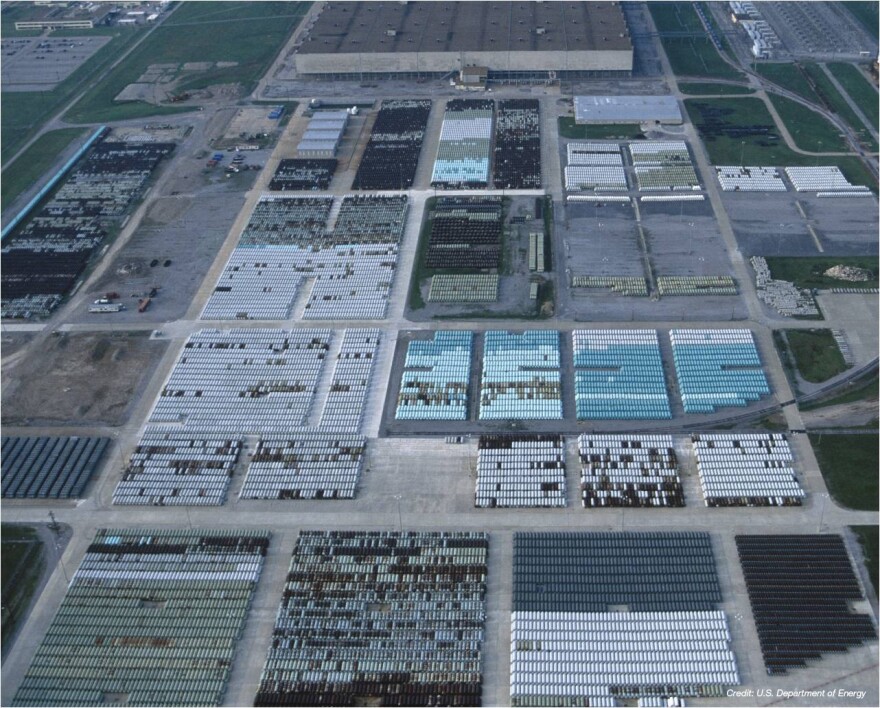It took ten years for the Kentucky legislature to pass Senate Bill 11, known as the “Leeper Act,” lifting a moratorium on the nuclear industry. But state leaders say it could take another decade before there is nuclear energy development in the commonwealth. Governor Matt Bevin and area lawmakers gathered in Paducah on Wednesday after for a ceremonial signing of the bill.
Former state senator Robert Leeper long sought legislation lifting the moratorium. His successor Danny Carroll passed the measure this year, thanks he said to a supportive governor and a republican-lead House.

The now McCracken County Judge Executive was emotional as he thanked his wife and those that supported the bill during the “difficult times.”
“Thanks for never giving up...because when you can’t make something happen, you gotta have somebody to push you back out there.” Leeper said.
While Leeper said he is often credited with being the “machine” behind the bill, he said it was David Mast, U.S. Congressman Ed Whitfield's Paducah Area Field Representative, who first approached him with the idea when he said ‘here’s something that I think would benefit the community.’
State Sen. Steven Rudy and state Rep. Gerald Watkins, among others in the room were also thanked in helping to move the bill through the legislature.
Moratorium Explained
“A lot of people don't understand the moratorium in our state actually had to do with the storage of spent nuclear fuel.” Carroll said. “It's considered high level nuclear waste and that's actually what the moratorium consisted of,” he said. Under the past law, the state wasn’t allowed to store that material. With the ban lifted, now it can be stored.
“A lot of people also don't understand” he said, “that there is a federal storage site in the Yucca Mountains.”
In 2013 the Department of Energy filed a motion with the Nuclear Regulatory Commission to withdraw the license application for a high-level nuclear waste repository at the site. The DOE decided to terminate the Yucca Mountain repository program because, according to a Government Accountability Office report, "it is not a workable option and there are better solutions that can achieve a broader national consensus."
Carroll believes however, that the site will reopen “in the near future to take this material.”
Carroll said there is currently enough depleted uranium stored at the old USEC facility “to power the entire U.S. for the next 700 years.” Paducah is home to a former, long-running nuclear enrichment plant.
Carroll and others have discussed possibilities (and concerns) involving the Paducah site.

While a nuclear power plant may not be in the state’s immediate future, technology created by Terra power, a nuclear energy company owned by Bill Gates, can utilize depleted uranium as its main fuel. According to the company website, “more than 750,000 metric tons of depleted uranium sits useless, like that stored in Paducah, Ky.”
More Energy Options, Means More Business
Governor Matt Bevin said with the moratorium lift, Kentucky is now on a ‘level playing field’ to compete for companies like General Electric - who has expressed interest in developing a laser enrichment plant at the former Paducah uranium enrichment site. Bevin also said a nuclear plant is not in the immediate future, but says private conversations point towards nuclear-fueled opportunities down the road.
Bevin called west Kentucky a “crown jewel” with “untapped possibilities” in workforce development and energy leadership.
“You can bet I'll be talking about some of the things that we've been talking about even today when I meet with the President tomorrow,” Bevin said. He is meeting with President Donald Trump and U.S. Secretary of Transportation Elaine Chao on Thursday to discuss workforce development.
Senator Carroll said the legislation is “crucial” for Kentucky to sustain inexpensive power for businesses interested in developing in the state.
“You all know that our governor is somewhat of a maverick in our country,” Carroll said as he described the governor as a man of action. A leadership quality he said is needed to “set a clear path for our future in how we were going to get there.” Carroll mentioned other challenges that are ahead for the state, like “ the undertaking that we are about to have as we go through tax revision.” He said “it is crucial that the residents of our state begin to have more faith in our state government.”
“United we stand, divided we fall”

Members of Kentuckians for the Commonwealth waited outside the event with signs reading “Bevin where you at? Can we get fair tax?” KFTC was founded in 1981 and known originally as the Kentucky Fair Tax Coalition.
Bevin approached the KFTC members and invited discussion regarding the group's’“Kentucky Forward Plan.”
While Bevin has not yet released a public plan addressing how he plans to fix the state’s $33 billion state pension deficit, he has called for a special session that will likely occur this October.
Marshall County resident and west Kentucky KFTC representative Amanda Groves said she asked Bevin to carefully consider the Kentucky Forward Plan, a tax plan that Groves said “is much for fair for citizens for the state from the top to the bottom.”
Groves said the governor was “very respectful” and seemed “open and willing to listen to us.”
After reviewing public remarks made by Bevin, Groves said KFTC members are “very concerned that the working class will bear the brunt of the tax reform with suggested cuts, as much as 5 percent from the top 1 percent earners.”
Bevin said he was grateful to the KFTC for “caring enough to come out here. The greatness of America is this…” He said the best advice he can give is “talk to your legislators, they are the ones that will be voting on these things.”





